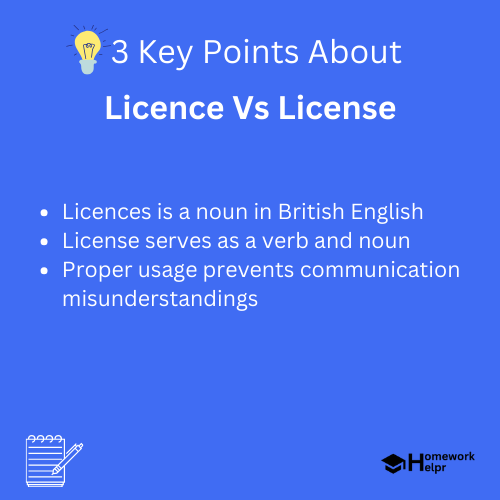📝 Summary
The terms licence and license are often confused, but they serve distinct purposes based on context. In British English, licence is a noun referring to legal permission, while in American English, license is primarily a verb that grants rights or permissions. While licence applies to various permits such as driving and business operations, license can also function as a noun in the U.S. Understanding these differences enhances clarity in communication. Proper usage prevents misunderstandings, especially in regional contexts. Understanding these terms is crucial for effective writing and communication skills.
Licence Vs License: Understanding the Differences
The terms licence and license are commonly used in everyday language, yet many people often confuse them. While they seem similar, these words have distinct meanings and usages depending on the context. Understanding how to use them correctly can enhance your writing and communication skills. In this article, we will explore the differences between licence and license, their definitions, and examples of their usage.
What is a Licence?
In British English, the word licence (with a -ce at the end) is used as a noun. It refers to a legal permission or authorization that allows a person to do something that they may not otherwise be allowed to do. For instance, individuals might obtain a licence to drive, to practice medicine, or to operate a business.

Examples of how the word licence is used include:
- She applied for a taxi licence to begin her driving career.
- The restaurant needs a food service licence to operate legally.
- He holds a private pilot‚’ licence and can fly small aircraft.
Definition
What is a License?
On the other hand, license (with a -se at the end) serves as a verb in both American and British English. It means to grant someone the right to do something or allow an action to take place under specific conditions. In American English, license can also be used as a noun.
For example, when someone licenses a piece of software, they are granting permission for it to be used legally.
- The company licenses its technology to other manufacturers.
- He was licensed to practice law after passing the bar exam.
Definition
Key Differences in Usage
The key differences in the usage of licence and license stem from their grammatical functions and regional preferences. Here are some points to remember:
- Licences is always a noun in British English.
- License can be both a verb and a noun, primarily in American English.
- The context often determines which term to use and how to apply it correctly.
❓Did You Know?
Did you know that in most countries, driving a vehicle without a valid license can result in hefty fines?
Common Misconceptions
One common misconception is that these two terms can be used interchangeably; however, this is not accurate. The confusion arises mainly from the different spellings based on regional variations. For instance, while British English sticks to licence for the noun, American English simplifies it to license. Understanding the regional differences is crucial for clear communication.
Examples
Consider this scenario: If Sarah is applying for a new driving licence in the UK, she needs to understand that ‚Äúlicence” refers to the document that gives her the legal authority to drive. In contrast, if she were in the US and someone said they were going to license her to drive, it means they are granting her the right to do so.
Practical Examples
Let‚’ illustrate the differences yet again with practical examples:
- In the UK: “He has a fishing licence.” (noun)
- In the US: “The state will license you to carry a concealed weapon.” (verb)
Both examples highlight how these terms serve different purposes within a sentence, emphasizing their unique roles based on context and non-interchangeability.
Definition
Importance of Correct Usage
Using the correct form can make a significant difference in your writing and communication skills. Misusing these terms may affect the clarity of your message, leading to misunderstandings. Whether you are writing an academic paper, crafting a letter, or communicating in a professional setting, proper terminology enables you to convey your point effectively.
Additionally, being mindful of regional variations in spelling helps avoid confusion, particularly in global communication. If you are unsure of which term to use, remember that a quick reference can clarify the nuances between licence and license.
Conclusion
In conclusion, understanding the differences between licence and license is essential for effective communication. As a student, mastering these terms can enhance your writing and prevent misunderstandings in both academic and professional settings. The difference boils down to regional spelling conventions and grammatical use: licence as a noun, especially in the UK, and license primarily used as a verb in both American and British English. Remembering these distinctions will empower you as confident communicators.
So, the next time you find yourself in a dilemma using licence or license, you now have the knowledge to make the right choice!
Related Questions on Licence Vs License
What does ‘licence’ mean?
Answer: Legal permission to do something.
How is ‘license’ used differently in American English?
Answer: It can be both a verb and noun.
Why are ‘licence’ and ‘license’ often confused?
Answer: Their regional differences in spelling and function.
How can misuse of these terms affect communication?
Answer: It can lead to misunderstandings and lack of clarity.
